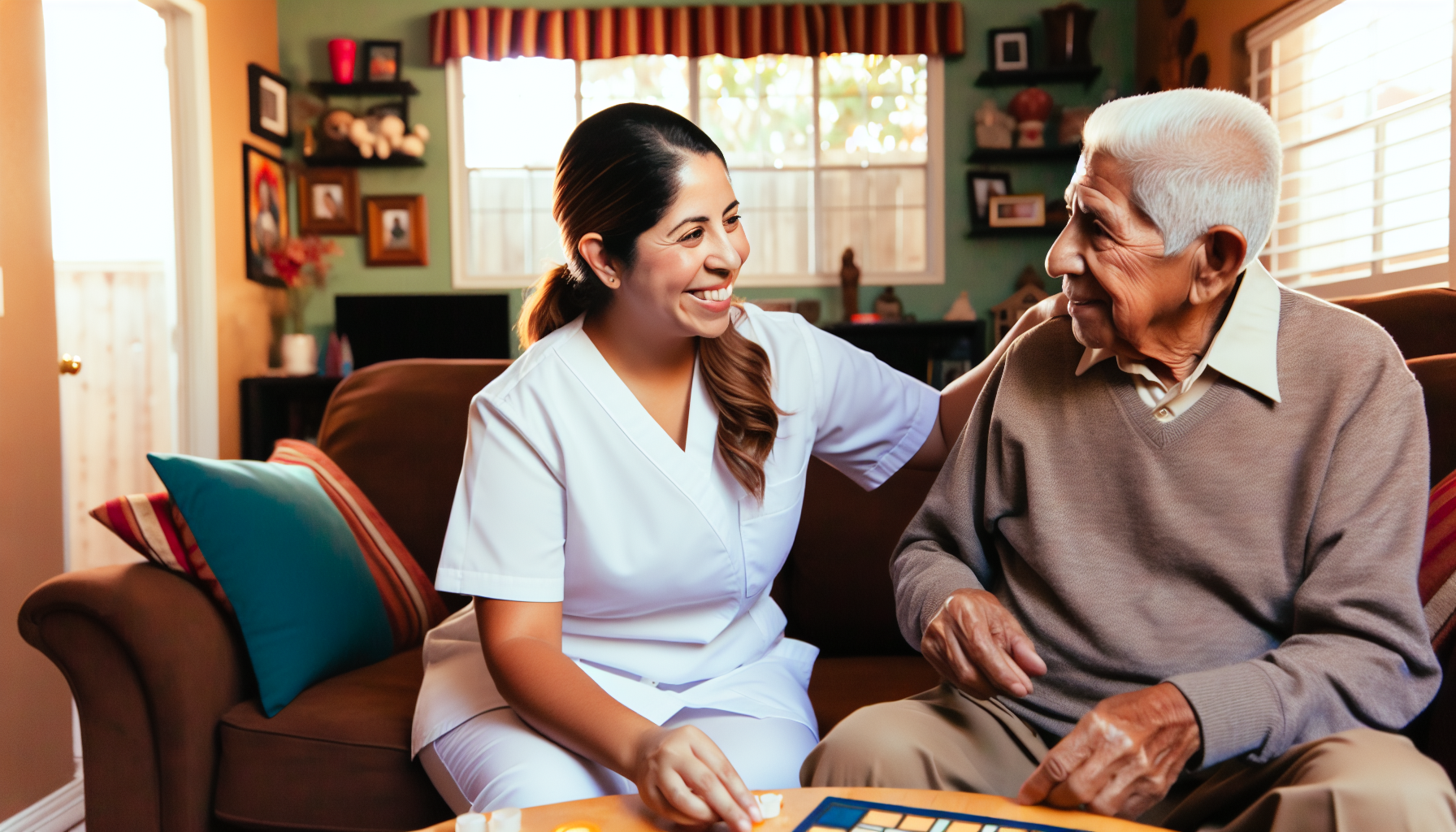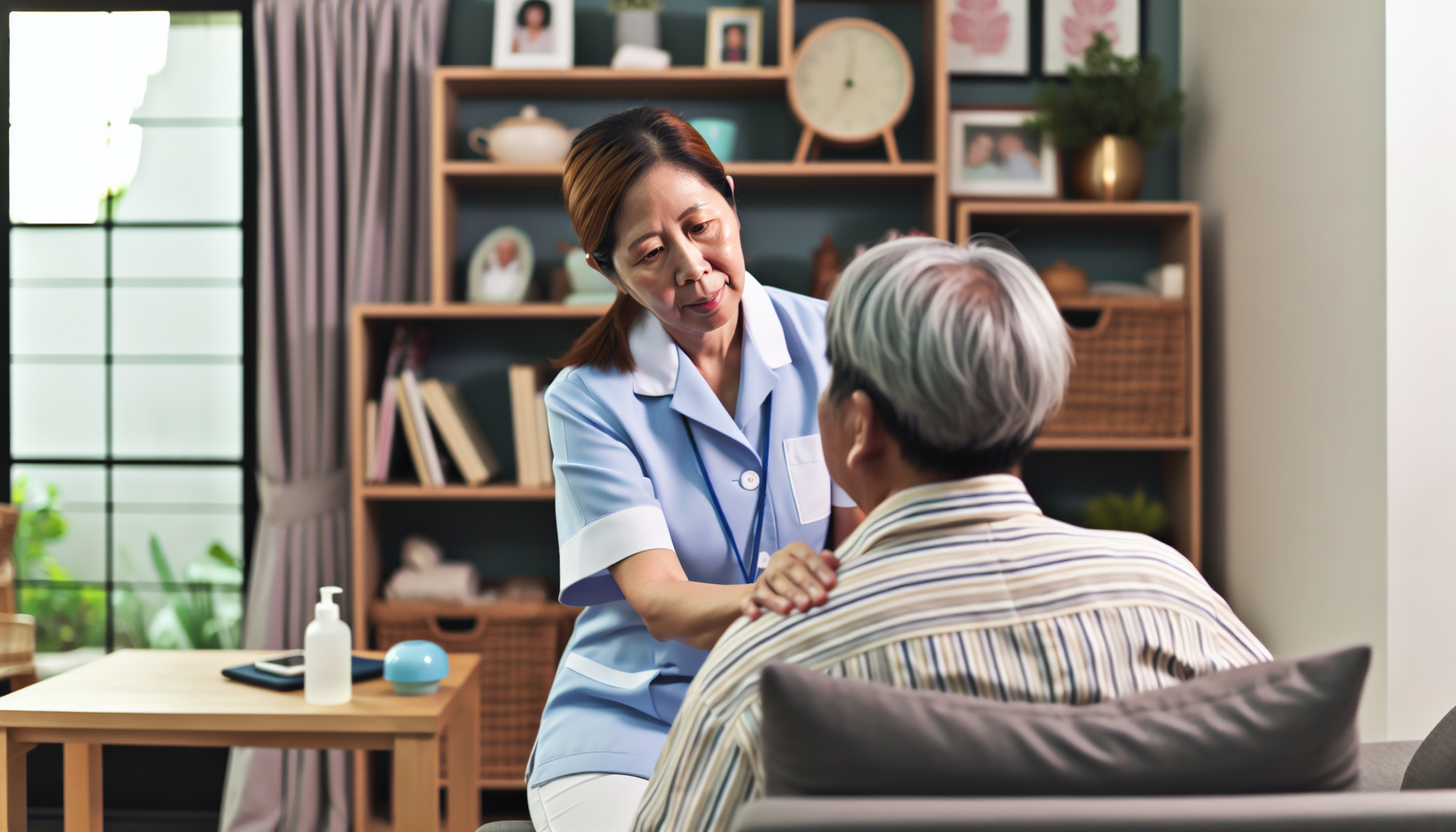Wondering ‘am I qualified to work in home health’? The answer hinges on a blend of accredited certifications, relevant training, and a caring nature. This article will guide you through the precise requirements and skills needed to care for patients in their homes, ensuring you know what it takes to excel in the home health field.
Key Takeaways
-
Home health care services extend beyond medical assistance to include companionship, emotional support, and help with daily activities, aiming to improve patients’ quality of life and independence.
-
Home health aides play a crucial role in home health care by monitoring vital signs, administering medication, providing care and companionship, requiring them to have both the technical and interpersonal skills.
-
Demand for home health services is skyrocketing, with employment projected to grow significantly, driven by an aging population and advancements in healthcare technology, offering abundant opportunities in this career field.
Understanding Home Health Care

Home health care services are not limited to just medical assistance. They are centered around providing comprehensive care to patients who are unable to care for themselves, helping them maintain their independence and stay at home longer. Home health aides play a pivotal role in this equation. They are responsible for monitoring patients’ vital signs, administering prescribed medications, and providing assistance with physical therapies as needed.
However, home health aide services, which can be covered by medicaid services, are not just confined to medical care. They offer a range of services including:
-
Companionship
-
Emotional support
-
Assistance with daily activities
-
Help with maintaining or improving independence
Consequently, home health care services, including medical services, contribute significantly to the quality of life of patients, enabling them to live with dignity and comfort in their homes.
Home Health Visits & Who Can Perform Them

Home health visits form the foundation of home health care services. These visits are designed to provide care and monitor the health of patients in the comfort of their homes. So, who is responsible for these visits? Home health visits can be performed by various health care professionals, including registered nurses, licensed practical nurses, and, of course, home health aides.
Home health aides are trained professionals who have undergone home health aide training and are certified to provide care in a home setting. They are equipped with the skills to provide:
-
Personal care
-
Administer medication
-
Monitor vital signs
-
Provide companionship to patients
Given the wide array of services they offer, home health aides play a pivotal role in delivering quality home health care to patients.
Monitoring Health: Vital Signs and Beyond
Home health aides, serving as more than just caregivers, play an essential role in evaluating a patient’s health status. Monitoring vital signs such as:
-
blood pressure
-
pulse
-
respiration
-
temperature
is a routine part of their job. These vitals serve as an early warning system, allowing home health aides to detect early signs of clinical deterioration and intervene promptly.
Apart from monitoring vitals, home health aides are also trained to observe other signs that may indicate a health issue, such as:
-
a flushed appearance
-
changes in skin color
-
changes in breathing patterns
-
changes in behavior
They are also equipped to administer medication, enabling them to respond quickly to changes in a patient’s condition. Leveraging their technical expertise and alertness, home health aides play a significant role in preserving the health of patients.
Skills Needed To Perform Home Health Visits

Conducting home health visits is not an easy task. It requires a diverse set of skills ranging from clinical expertise to effective communication. For instance, clinical nurse specialists and other skilled nursing professionals need top-notch clinical skills to deliver a variety of skilled services including:
-
assessment
-
wound care
-
medication administration
-
tube feeding
Eating a well-balanced diet is essential for maintaining good health and well-being. One of the best ways to ensure you’re getting all the nutrients you need is through proper meal preparation. By planning and preparing your meals in advance, you can save time, money, and reduce food waste.
Communication skills are equally important. Home health care providers need to:
-
Effectively impart and receive crucial information during patient visits
-
Be active listeners, paying attention to both verbal and non-verbal cues to understand the unspoken needs or concerns of patients
-
Be organized, creative, and professional, ensuring that they deliver high-quality care in a patient’s home.
Why Home Health Agencies Prioritize Clinical Notes After Home Health Visits

Clinical notes form a vital part of home health care. They serve as a comprehensive record of a patient’s condition, the care provided, and the progress made. They are essential for effective care planning and coordination,. Home health agencies prioritize clinical notes after visits, ensuring that such informative data is captured for various purposes.
Clinical notes serve multiple purposes, including:
-
Predicting patient hospitalization or emergency department visits
-
Managing patient risk and improving outcomes
-
Serving as a legal document
-
Being required for reimbursement from insurance providers and Medicare
-
Providing essential information for quality assurance within the agency, allowing for the evaluation of patient outcomes and the effectiveness of care interventions.
Essential Skills for Success in Home Health Care
Success in home health care requires a blend of various skills, including:
-
Interpersonal abilities
-
Technical know-how
-
Adaptability
-
Problem-solving
-
Effective time management
These skills are all integral to delivering high-quality home health care services, including skilled nursing care at a skilled nursing facility.
Let’s delve deeper into these crucial skills.
Interpersonal Abilities: Communication and Compassion
Interpersonal abilities are at the heart of home health care. Building a rapport with patients and their families is crucial, and this requires:
-
Effective communication
-
Compassion
-
Dedication to dedicating time for discussions
-
Being clear and concise in communication
-
Actively listening to understand the needs and desires of both the care recipient and their family members
Understanding and responding to non-verbal cues are also crucial. These skills help to foster trust and understand the feelings of the care recipient. Moreover, providing companionship and engaging in social activities with patients is a part of the compassionate care that home health aides provide, contributing to the overall well-being of patients.
Technical Know-How: Medical Equipment and Procedures
Technical expertise forms a core skill for home health aides. It encompasses a wide range of competencies, including:
-
Familiarity with medical equipment and procedures
-
Basic medical knowledge
-
The ability to monitor vital signs and administer medications
-
Understanding of diseases and illnesses
-
Certification in CPR and first aid
-
Knowledge of medical terminology
In addition, home health aides need to know how to:
-
Select appropriate medical equipment that aligns with the patient’s specific requirements
-
Maintain the equipment effectively
-
Conduct routine inspections of medical equipment for any signs of damage
These steps are crucial to avert accidents and guarantee the equipment remains operational and safe for patient use.
Adaptability and Problem-Solving in Patient Care
Flexibility and problem-solving abilities are vital for delivering effective home health care. Each patient is unique, and their care requirements can change over time. Home health aides must be able to adapt their care plans to the specific and changing needs of patients. They also need to perform home safety checks and assess fall risks, ensuring a safe living environment for the patient.
Problem-solving is another key skill. Home health aides often find themselves facing care-related issues that they need to address promptly. Prioritizing caregiving tasks, setting realistic goals, and networking with other healthcare providers can lead to more effective problem-solving.
The Expanding Horizon of Home Health Agencies
The scope of home health agencies is broadening. Medicare-certified home health agencies are hiring home health aides to provide outpatient care services to patients who are homebound and require skilled care, a requirement for Medicare coverage. This has opened up new opportunities for home health aides to provide care outside of a traditional healthcare setting.
In addition to assisting with therapeutic exercises and activities, home health aides are also trained to manage durable medical equipment and medical supplies in certain care settings, including those involving physical therapy. With these expanding roles and responsibilities, the demand for qualified home health aides is set to rise, making it a promising career field.
The Growing Demand for Home Health Services

The need for home health services is increasing. The employment for certified home health aides is projected to grow by 22% from 2022 to 2032, much faster than the average for all occupations. The number of jobs for home health aides is also estimated to increase by 33 percent from 2020 through 2030, further supporting the trend of rapid job growth in this field.
This growing demand is driven by an aging population and advances in healthcare technology. More and more seniors are opting for home health care services, contributing to an unprecedented high demand for qualified and trustworthy home health aide professionals. Thus, if you’re looking to make a difference in the lives of people while pursuing a rewarding career, home health care might just be the field for you.
Working Home Health Visits To Supplement A Full-Time Nursing Career
Taking on home health visits can complement a full-time registered nurse career. This avenue offers flexibility and the opportunity to provide personalized care to patients in their homes. Home health nurses can choose between traditional work hours or a more flexible schedule, which can include working overnight, four days per week, or weekends.
Home health nursing allows for a personal touch in patient care, requiring nurses to understand and adapt to the unique needs of each patient. Nonetheless, nurses thinking of adding home health visits to their full-time work should possess robust assessment skills and experience, especially in acute-care environments.
Summary
In conclusion, home health care services are an essential component of the healthcare ecosystem. They provide a comprehensive care approach, allowing patients to maintain their independence and live comfortably in their homes. Home health aides play a pivotal role in this equation, providing medical care, companionship, emotional support, and assisting patients in maintaining or improving their level of independence.
The field of home health care is growing rapidly, and the demand for qualified home health aides is higher than ever. This makes it a promising career field, especially for those looking to make a difference in people’s lives. With the right skills and training, you can succeed in this rewarding field and contribute to the well-being of patients in need of home health care.
Frequently Asked Questions
Who qualifies for Home Health Care services in Illinois?
Persons who are under 60 and have severe disabilities may qualify for the Illinois Department of Human Services’ Home Services Program, while those age 60 or older may be eligible for the Illinois Department on Aging’s Community Care Program or other relevant programs.
How do you qualify for home health care in Texas?
To qualify for home health care in Texas, residents must be 21+ years old and require assistance with at least one daily living activity like bathing or grooming. Consider reaching out for an assessment to determine eligibility.
What do you need to be a home health aide in Ohio?
To become a home health aide in Ohio, you need to meet the federal training requirements, which include 75 hours of home healthcare training, including 16 hours of supervised practical or clinical training.
What is home health care?
Home health care is a critical healthcare service that allows patients to receive medical care and support at home, helping them maintain independence and stay at home longer. It includes services such as medical care, monitoring vital signs, administering medication, and providing companionship.
What does a home health visit involve?
A home health visit involves medical practitioners providing care and monitoring the health of patients in their homes, including vital sign monitoring, medication administration, physical therapy assistance, and companionship.

